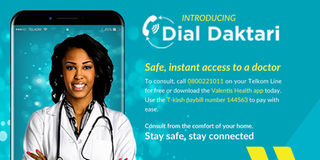Telemedicine services should be adopted as the new normal in Kenya

The evolution of Covid-19 in the world has concreted the absolute need to reduce movement to mitigate the risks of person-to-person infections as per the measures put in place by health authorities during the pandemic.
The supposition that self-managed quarantine is what is needed to manage the spread of Covid-19, does not not consider that the shifted landscape has presented a cocktail of challenges for most Kenyans.
There are widespread pay-cuts, joblessness, fear, uncertainty, among other issues. This has easily driven people to a mentally unstable place, rife with depression, anxiety and post-traumatic-stress-disorders. With the rise in such unprecedented issues, there is most definitely need calling for a novel approach to patient care.
REDUCE PHYSICAL CONTACT
For decades, global healthcare innovations, leveraging telecommunications technology, have attempted to reduce physical patient-to-doctor consultation.
Telemedicine, the remote diagnosis and treatment of patients by means of telecommunications technology has gradually become acceptable. With the new normal and preventive measures in place, telemedicine might be the antidote to patient care.
HURDLES
In Kenya, hurdles such as consumer perceptions on patient care, requisite infrastructure supporting this technology, reach, cost, lack of awareness and government policy have negatively impacted its growth trajectory.
Nevertheless, Kenya’s mobile and broadband technology growth and envisioned affordable healthcare agenda, works favourably for its growth.
To consummate these strategic advantages, under the prevailing conditions, telecoms provider Telkom Kenya and Valentis Health, a doctor-founded healthcare service providing telemedicine, have partnered to provide convenient and subsidised access to medical consultations.
Through a medical consultancy service, dubbed Dial Daktari, patients will have access to board licensed doctors, via their phones.

HOW DOES DIAL DAKTARI WORK?
Patients, who are also customers of Telkom will access this service through a toll-free number, 0800-221-011.
A care manager will take the patient through triage and assign them to a doctor for a consultation session. If a prescription is required, one will be issued by the doctor and will be sent directly to one of various partnering pharmacies or directly to the patient.
Dial Daktari will also make referrals to specialists or to laboratories for further investigations.
In emergency cases, Dial Daktari will facilitate the dispatch of an ambulance to the patient for further assessment and even transfer to a hospital. Patients will access the teleconsultation service at a cost of Sh450, payable via the mobile money platform T-Kash.
In addition to the phone consultations, the Valentis Health App will allow patients to track symptoms, communicate with the doctors via text, and also through video consultations.
COUNSELLORS
With Mental health becoming an increasing and rising concern in this time, Dial Daktari has a team of counsellors to assist patients experiencing acute stress and anxiety, and these can also be accessed via telephone.
The Founder and CEO of Valentis Health, Dr Don Othoro, reckons, “The integration of online and offline healthcare means that our doctors are able to deliver seamless consultations, just as they would in person.
He adds, “With the Covid-19 crisis and mandatory physical distancing guidelines, patients have been asked to avoid unnecessary visits to health care facilities where they may put themselves or others at risk of infection. With this in mind, telemedicine has become an integral part of primary health care, enabling patients to seek medical attention for non-Covid-19 medical conditions, as well enquire about possible Covid-19 symptoms.”
WORKING FROM HOME
Telemedicine may not have previously had the success story it had hoped to achieve, globally and certainly in Kenya. However, as companies and even schools now adopt the reality of working and studying from home, remote consultation could become a game-changer, as an increasingly attractive option in healthcare, now and post Covid-19.
Rightfully, both the CDC and WHO are advocating for telemedicine to monitor patients and reduce risks of them spreading the virus by traveling to hospitals.
Telkom’s Chief Executive Officer Mugo Kibati says, “Technology will continue to play an integral part in the lives of Kenyans, more so now that it is enabling them to make the switch to conducting their affairs, virtually, from home: working from home, distance learning, virtual socialisation and now even getting to have medical consultation via phone. As a corporate citizen, we at Telkom chose to continue focusing our corporate social interventions and partnerships on areas such as these, where our core service will have direct and immediate impact, during this time.”
DONATION
On that streak, the telecoms company also donated a 50Mbps as well as a 200Mbps link to the Kenyatta National Hospital’s Infectious Diseases Unit at Mbagathi and the Ministry of Health’s National Emergency Response Committee on Coronavirus, respectively.
The free Internet has continued to enable patients in quarantine, frontline nurses, medical officers and doctors to keep in touch with their loved ones and the outside world. It is also supporting work in the fight against the Covid-19 pandemic in Kenya.
Under the threat of Covid-19, the importance of Telemedicine could dramatically lift the burden off from existing healthcare infrastructure and reduce the overall cost of health services.
In the immediate future, its availability will allow those following treatment for other conditions to continue doing so or even filter out potential Covid-19 cases remotely.
Lastly, the innovation enhances the attractiveness of the healthcare sector employment landscape, an opportunity for medical practitioners in the country.


